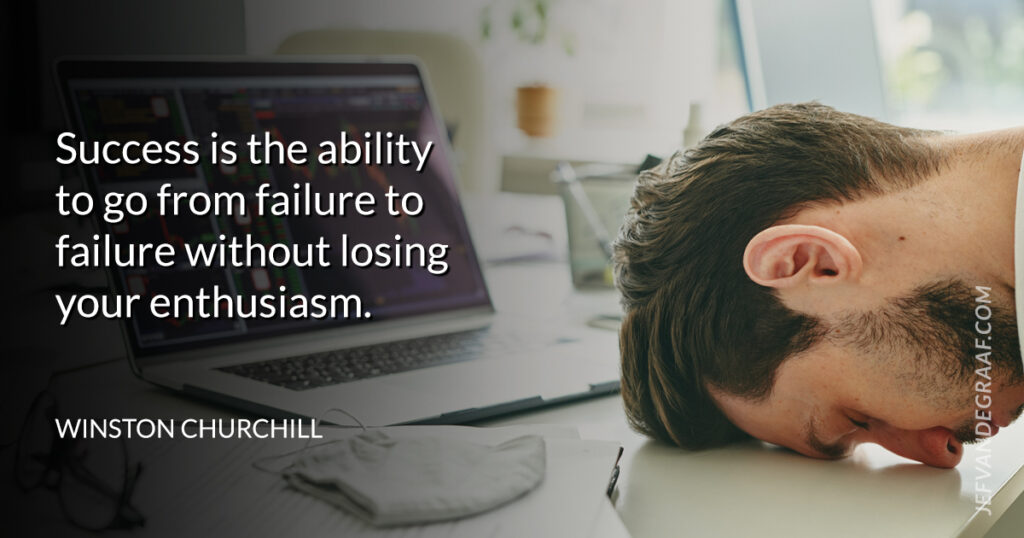
Feeling like a failure?
Imagine a time you spent weeks, months, or even years working toward something that just didn’t… work.
How badly did this cripple you? Were you unable to move for weeks, months, or even years? What helped you to get through and onto new things with your life?
Failure is a hurdle that often gets in the way whenever we invest a significant amount of time, energy, and resources to achieve a specific goal.
Perhaps you applied for your dream job but they hired someone else instead. Maybe you finally worked up the courage to ask out your crush but they rejected you because you’re too “nice.” Or, quite possibly, you tried starting a freelance business but you never made a single dollar.
There are endless scenarios that we define as a failure and there are three fundamental rules that control them.
Just because you failed once doesn’t mean you’re going to fail at everything.
Marilyn Monroe
1. Failure is Inevitable
Failure is an inevitable and necessary part of every learning experience.
Anytime we do something new, it puts our body, mind, and behavior into a state of testing, feeling, and experimenting.
Not everyone who picks up a bike is going to ride it on their first try successfully. It takes time to find our balance, to gain momentum, and to confidently ride without training wheels or dad hold tightly to the back seat.
We’re going to fall, scrape our knees, and that hurts — a lot.
But after every fall, there’s nothing else to do except to get back up on our feet and try again. Or, there’s always skateboarding or jogging or playing guitar or something we can do.
“Failure should be our teacher, not our undertaker. Failure is delay, not defeat. It is a temporary detour, not a dead end.”
Denis Waitley
2. Failure is Temporary
Just think, if our bodies couldn’t heal scraped and bloodied knees, our species would never have survived this long.
Failure comes, and failure goes.
It’s not something to dwell on, but the problem is, so many of us become so fixated on them.
If only I did this instead of that. I should have turned left instead of right.
We’re creative creatures. Our mind has an incredible gift to invent scenarios to solve problems but also to create problems.
Judy Willis, a neurologist who studies the effects of failure on the brain, says this:
As you internalize your thwarted efforts to achieve your goals and interpret them as personal failures, your self-doubt and stress activate and strengthen your brain’s involuntary, reactive neural networks. As these circuits become the automatic go-to networks, the brain is less successful in problem-solving and emotional control.
Worry, anxiety, and focusing on failure is only going to prolong the effect of failure. Instead of using all that brainpower to concentrate on the past, why not use it toward finding two new doors of opportunity and ways of opening them?
“If a person is working toward a predetermined goal and knows where they’re going, that person is a success. If they’re not doing that, they’re a failure.”
Earl Nightingale
3. Failure is Success
If you’re still alive, that’s a good sign. It means failure is behind you, and there’s still plenty of time left to succeed.
The key difference that separates champions from everyone else is not ability or talent. It’s not always about opportunities or luck, either. The crucial difference is in determining how to handle failures, setbacks, and mistakes by using them to navigate more closely to our goals.
Failure is a tool that helps us to become better. It points out our weak spots, shows us our strengths, and proves to us what kind of person we are.
So long as we don’t ignore the valuable information that our failures can teach us, we can keep moving forward and find the secrets to our ultimate success.
Looking for ways to improve?
Failure without growth can make us feel like we’re going nowhere. It has the ability to destroy all hopes and dreams if we allow it. If want to read more about overcoming failure and creating a success-focused life, here are a few book recommendations:
- Atomic Habits: Tiny Changes, Incredible Results by James Clear
- The 7 Habits of Highly Effective People by Stephen R. Covey
- Think and Grow Rich by Napolean Hill
To see more books on this topic, see Best Personal Development Books.

 All You Need is Struggle
All You Need is Struggle
Leave a Reply